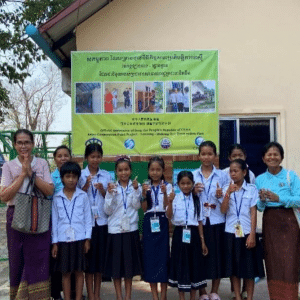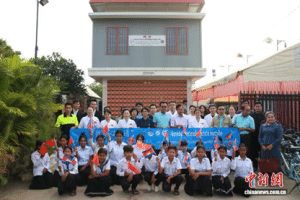Environmental NGOs and scholars are upset over a possible revision to the Environmental Protection Law that would permit only one GONGO (government-organized NGO) to file environmental public interest lawsuits, preventing NGOs from serving as primary plaintiffs.
The latest controversy in the saga regarding the environmental protection public interest lawsuit concerns a draft revision of the Environmental Protection Law. The draft, released in late June, would narrow the pool of possible social organization plaintiffs from “relevant social organizations prescribed by the law” (法律规定的有关社会组织) as stated in the latest revision of the Civil Procedure Law, to include only “the All-China Environment Federation and provincial, autonomous region and municipality level Environment Federations.” The public interest lawsuit provision, which allows organizations not directly harmed by environmental pollution to file a lawsuit on behalf of the public interest, has been viewed by many as a potentially potent weapon in the battle against the serious environmental degradation plaguing the country.
Concerns about the altered clause are twofold: First, many have argued that the “monopolization” of the public interest lawsuit by the All-China Environment Federation (ACEF), which is a GONGO established in 2005 by the Ministry of Environmental Protection, will prevent the participation of other organizations and individuals, thus suppressing the potential of the lawsuit to represent the will of the people. Second, the recognition of the ACEF as the sole plaintiff for public interest lawsuits has led some to question whether its background and membership will limit its ability to prioritize the public interest over other political and economic interests.
The revision to the clause would indeed deliver a mortal blow to environmental NGOs’ efforts to utilize the public interest lawsuit. The environmental NGO, Friends of Nature (自然之友), had already begun to exercise the provision as early as 2011 with a lawsuit in Yunnan, where provincial-level legislators had passed a less restrictive version of the law. Friends of Nature, in collaboration with another NGO, Chongqing Green Volunteers League (重庆市绿色志愿者联合会) and the Qujing City Environmental Protection Bureau, filed a public interest lawsuit accusing Luliang Chemical Industry of discharging more than 5,000 metric tons of toxic heavy metal into three Qujing townships. If the national Civil Procedure Law precludes the participation of NGOs as plaintiffs, however, all lower-level courts will be bound by its specifications, threatening the two NGOs’ participation in the suit. As one article put it, “while the new clause will crack open the door for public interest lawsuits, it will also close all of its windows.”
In a letter addressed to the drafters of the Environmental Protection Law (Revised Draft), the Standing Committee of the National People’s Congress (NPC), and the NPC’s Environment and Natural Resources Committee, signatories listed as “all those concerned with China’s environment” criticized the new draft, arguing that “only when it is ensured that the public can participate in environmental protection, when everyone has the right to file an environmental public interest lawsuit, will we be able to address the damage done to the environment, and enable society to return to the greatest level of stability and tranquility.” The letter expressed disapproval of a process that would allow the ACEF to serve as the sole arbiter determining whether publicly raised pleas should be implemented, barring other mechanisms for filing a suit. In conclusion, the letter requests that the clause be altered to specify that “every citizen of the People’s Republic of China, every natural person and legal person, can file a public interest lawsuit in the People’s Court.”
Some would argue that the letter is overly ambitious, particularly given the stated concerns of policymakers that opening the gates too wide will lead to an “explosion” of public interest lawsuits, many of which will be undertaken by groups without the funding or expertise to ensure its effective implementation. Chen Lihao, Jiusan Society member and deputy director of its population natural resources and environment committee, offers a more moderate suggestion that lawmakers clarify that only legally registered groups which possess the appropriate scale and influence will have the right to file a suit, and that these credentials will be granted by the Ministry of Environmental Protection. Others have raised similar suggestions that would delineate specific requirements concerning registration status, date of registration, number of personnel, and annual expenditures.
The concern over the exclusion of NGOs and individuals from the public interest lawsuit provision is also closely tied to doubts about ACEF’s ability to place the needs of the public before those of the government or enterprise. In a period when scandals involving organizations such as the Chinese Red Cross and the China Charity Aid Foundation for Children have led to widespread opprobrium against graft and mismanagement in government-organized NGOs, the decision to grant a monopoly to a GONGO may seem ill-advised to many. Additionally, as one article argues, the ACEF is very much part of the government apparatus, as a subordinate of the Ministry of Environmental Protection and a recipient of government funds. This orientation will make it difficult for the ACEF to file suits involving negligence on the part of local Environmental Protection Bureaus or other government agencies, which some believe is the linchpin of sustained pollution.
Another factor raising doubts about the effectiveness of the ACEF is its membership. As a membership organization, the ACEF collects membership fees which range from RMB 10,000 to 300,000. Many of these members are entrepreneurs who may be responsible for a significant amount of China’s environmental degradation. With prohibitively high entrance fees that skew membership away from NGO employees and toward wealthy businessmen, the ACEF may prove hesitant to take on cases concerning its own members, or to threaten its potential membership base by attacking other prominent businessmen. According to China Public Interest Lawsuit Net (中国公益诉讼网) editor Li Gang, this conflict of interest may be the reason that some say lawsuits filed by the ACEF “hit flies, but don’t dare to hit tigers.”
Addressing these concerns about the capacity of the ACEF to serve as the solitary agent of the public interest lawsuit, ACEF Vice-Chairperson and Secretary-General Zeng Xiaodong has stated that the organization will be open to collaboration with NGOs and other social organizations, and plans to develop an environmental public interest law firm and related organizations which will carry out environmental monitoring, pollution damage assessment, and arbitration. Another article suggests that the ACEF should also invest greater effort in transparent operation, and should be more discriminating concerning its membership base, rejecting applicants who do not comply with environmental protection standards.
The latest draft of the Environmental Protection Law has aroused the consternation of NGOs and others who see vast potential in the public interest lawsuit as a mechanism for utilizing the courts to represent the interests of the public. If the lawsuit is limited to the ACEF, the provision, while still serving to ameliorate environmental damage, will primarily serve as an internal mechanism vulnerable to subordination to other interests and aims. The most harmful environmental damage, then, could remain unaddressed. For their part, NGOs would fail to gain a promising tool in carrying out their environmental advocacy missions. Yet all hope is not lost—as one article points out, the revision is still in a draft phase, and it is likely that this debate will encourage lawmakers to broaden the scope of the clause to include other social organizations. If so, the law will constitute a major step forward for environmental NGOs, significantly expanding their legitimacy and influence in environmental protection.



